

Atheism. "Divine Fury" by Sabina Nore.Traditionally speaking, most religions were especially hostile towards women.
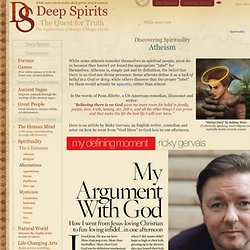
While some atheists consider themselves as spiritual people, most do so because they haven't yet found the appropriate "label" for themselves. Atheism is, simply put and by definition, the belief that there is no God nor divine presence. Some atheists define it as a lack of belief in a God or deity, while others discover that the proper "label" for them would actually be agnostic, rather than atheist. Index page. Great People and Outstanding Minds - Deep Spirits. Narcissistic Personality. The Human Mind Narcissistic Personality Disorder.

Abraham Maslow. Abraham Harold Maslow (/ˈmæzloʊ/[citation needed]; April 1, 1908 – June 8, 1970) was an American psychologist who was best known for creating Maslow's hierarchy of needs, a theory of psychological health predicated on fulfilling innate human needs in priority, culminating in self-actualization.[2] Maslow was a psychology professor at Brandeis University, Brooklyn College, New School for Social Research and Columbia University.
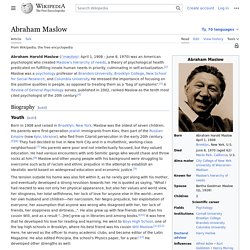
He stressed the importance of focusing on the positive qualities in people, as opposed to treating them as a "bag of symptoms. "[3] A Review of General Psychology survey, published in 2002, ranked Maslow as the tenth most cited psychologist of the 20th century.[4] Carl Rogers. Carl Ransom Rogers (January 8, 1902 – February 4, 1987) was an influential American psychologist and among the founders of the humanistic approach (or client-centered approach) to psychology.
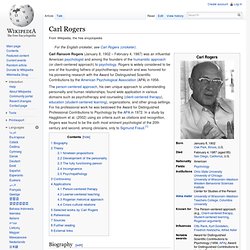
Rogers is widely considered to be one of the founding fathers of psychotherapy research and was honored for his pioneering research with the Award for Distinguished Scientific Contributions by the American Psychological Association (APA) in 1956. The person-centered approach, his own unique approach to understanding personality and human relationships, found wide application in various domains such as psychotherapy and counseling (client-centered therapy), education (student-centered learning), organizations, and other group settings. For his professional work he was bestowed the Award for Distinguished Professional Contributions to Psychology by the APA in 1972. Free will. Though it is a commonly held intuition that we have free will,[3] it has been widely debated throughout history not only whether that is true, but even how to define the concept of free will.[4] How exactly must the will be free, what exactly must the will be free from, in order for us to have free will?
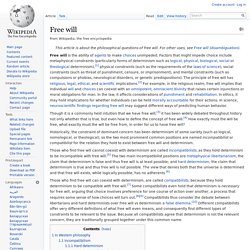
Historically, the constraint of dominant concern has been determinism of some variety (such as logical, nomological, or theological), so the two most prominent common positions are named incompatibilist or compatibilist for the relation they hold to exist between free will and determinism. In Western philosophy[edit] The underlying issue is: Do we have some control over our actions, and if so, what sort of control, and to what extent?
These questions predate the early Greek stoics (for example, Chrysippus), and some modern philosophers lament the lack of progress over all these millennia.[11][12] Humanistic psychology. Humanistic psychology is a psychological perspective which rose to prominence in the mid-20th century in response to the limitations of Sigmund Freud's psychoanalytic theory and B.F.

Skinner's behaviorism.[1] With its roots running from Socrates through the Renaissance, this approach emphasizes individuals inherent drive towards self-actualization and creativity. It typically holds that people are inherently good. It adopts a holistic approach to human existence and pays special attention to such phenomena as creativity, free will, and human potential. It encourages viewing ourselves as a "whole person" greater than the sum of our parts and encourages self exploration rather than the study of behavior in other people. Temperments. Social learning theory. Is a perspective that states that people learn within a social context.
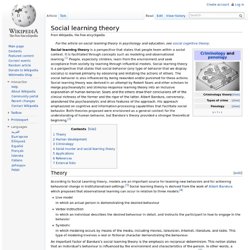
It is facilitated through concepts such as modeling and observational learning. [ 1 ] [ edit ] Theory According to Social Learning theory, models are an important source for learning new behaviors and for achieving behavioral change in institutionalized settings. [ 2 ] Social learning theory is derived from the work of Albert Bandura which proposed that observational learning can occur in relation to three models: [ 3 ] • Live model – in which an actual person is demonstrating the desired behaviour. Social Learning. George Kelly (psychologist) George Kelly (born George Alexander Kelly; April 28, 1905 – March 6, 1967) was an American psychologist, therapist, educator and personality theorist.
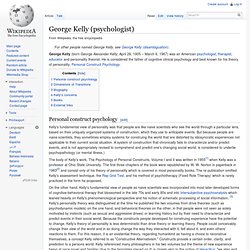
He is considered the father of cognitive clinical psychology and best known for his theory of personality, Personal Construct Psychology. Kelly's fundamental view of personality was that people are like naive scientists who see the world through a particular lens, based on their uniquely organized systems of construction, which they use to anticipate events.
But because people are naive scientists, they sometimes employ systems for construing the world that are distorted by idiosyncratic experiences not applicable to their current social situation. Repertory grid. Introduction[edit] The repertory grid is a technique for identifying the ways that a person construes (interprets/ gives meaning to) his or her experience.
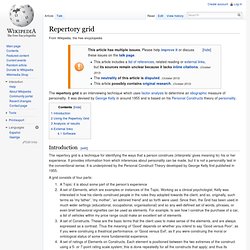
It provides information from which inferences about personality can be made, but it is not a personality test in the conventional sense. It is underpinned by the Personal Construct Theory developed by George Kelly first published in 1955. A grid consists of four parts: A Topic: it is about some part of the person's experienceA set of Elements, which are examples or instances of the Topic. Constructs are regarded as personal to the client, who is psychologically similar to other people depending on the extent to which s/he would tend to use similar constructs, and similar ratings, in relating to a particular set of elements. The client is asked to consider the elements three at a time, and to identify a way in which two of the elements might be seen as alike, but distinct from, contrasted to, the third.
Real self. Behaviorism. Behaviorism (or behaviourism), is the science of behavior that focuses on observable behavior only,[1] it is also an approach to psychology that combines elements of philosophy, methodology, and theory.[2] It emerged in the early twentieth century as a reaction to "mentalistic" psychology, which often had difficulty making predictions that could be tested using rigorous experimental methods.

The primary tenet of behaviorism, as expressed in the writings of John B. Watson, B. F. Skinner, and others, is that psychology should concern itself with the observable behavior of people and animals, not with unobservable events that take place in their minds.[3] The behaviorist school of thought maintains that behaviors as such can be described scientifically without recourse either to internal physiological events or to hypothetical constructs such as thoughts and beliefs.[4] Versions[edit]
Revised NEO Personality Inventory. Personality dimensions[edit] Name[edit] The original version of the measurement, published in 1978, was the Neuroticism-Extroversion-Openness Inventory (NEO-I). This version only measured three of the Big Five personality traits. It was later revised in 1985 to include all five traits and renamed the NEO Personality Inventory (NEO PI). British Psychological Society. The British Psychological Society (BPS) is a representative body for psychologists and psychology in the United Kingdom.
The BPS is also a Registered Charity and, along with advantages, this also imposes certain constraints on what the Society can and cannot do. For example, it cannot campaign on issues which are seen as party political. Eysenck Personality Questionnaire. In psychology, Eysenck Personality Questionnaire (EPQ) is a questionnaire to assess the personality traits of a person. It was devised by the psychologists Hans Jürgen Eysenck and his wife Sybil B. G. Eysenck.[1] Hans Eysenck's theory is based primarily on physiology and genetics. Mayan Comsogenises. 9 - Enneagram Type Nine: The Peacemaker. Type Nine in Brief Nines are accepting, trusting, and stable. They are usually creative, optimistic, and supportive, but can also be too willing to go along with others to keep the peace.
They want everything to go smoothly and be without conflict, but they can also tend to be complacent, simplifying problems and minimizing anything upsetting. They typically have problems with inertia and stubbornness. 8 - Enneagram Type Eight: The Challenger. Type Eight in Brief Eights are self-confident, strong, and assertive. Protective, resourceful, straight-talking, and decisive, but can also be ego-centric and domineering. Eights feel they must control their environment, especially people, sometimes becoming confrontational and intimidating. 7 - Enneagram Type Seven: The Enthusiast. Type Seven in Brief. 6 - Enneagram Type Six: The Loyalist. Type Six in Brief. 5 - Enneagram Type Five: The Investigator.
Type Five in Brief. 4 - Enneagram Type Four: The Individualist. Type Four in Brief. 3 - Enneagram Type Three: The Achiever. 2 - Enneagram Type Two: The Helper. 1 - Enneagram Type One: The Reformer. Claudio Naranjo. Oscar Ichazo. Oscar Ichazo (born 1931) is the Bolivian-born founder of the Arica School, which he established in 1968. George Gurdjieff. Enneagram of Personality. INTP. Myers-Briggs. Gestalt therapy. Structuralism (psychology) Experience. Philosophy of history. 47 Mind-Blowing Psychology-Proven Facts You Should Know About Yourself. Fallacy. 8 Ways to be UBER Charismatic. Manipulation. Psychology. Big Five personality traits.
Forte Communication Style Profile. Resonance. Psychoanalysis. Francis Galton. Id, ego and super-ego. Sigmund Freud. William Herbert Sheldon. Ernst Kretschmer. Johannes Kepler. Meyer Friedman. Psychological typologies. Minnesota Multiphasic Personality Inventory. Type A and Type B personality theory. Personality psychology. Jung type's tests (20 pcs.) [Archive] - Typology Central. Myers Briggs Personality Test MBTI Personality Types.
The 10 Scales of the MMPI-2. Psychological Testing: Minnesota Multiphasic Personality Inventory - Psychological Testing and Assessment, Neuropsychology and Intelligence Quotient Testing. Personality test based on Jung and Briggs Myers typology. Personality test. Personality test. Ego Speaks. Your True Self Revealed - Fast Fun Free Personality Tests. Watch Free Documentaries Online. Body of Thought: How Trivial Sensations Can Influence Reasoning, Social Judgment and Perception. Can't relax? It's all in your mind: Research shows stopping a thought puts more strain on the brain. Out of Our Brains. Embodied Cognition A New Marriage of Brain and Computer. Hacking the brain by predicting the future and inverting...
Think faster focus better and remember moreRewiring our brain to stay younger... Tuning In To The Brain's 'Cocktail Party Effect' Notes from the Undergrad. Your personal homepage. 120 Ways to Boost Your Brain Power.
Bobby McFerrin hacks your brain with the pentatonic scale. Sporcle.com: mentally stimulating diversions. 7 Skills To Become Super Smart. Ways to Improve Human Intelligence. Decision theory.
Carl Jung. Learning about the brain, body and how it all connects. Explorations of the Mind: Intuition. Myers-Briggs Type Indicator. Intuitionism. New Age - Intuition and spirituality. Complex (psychology) Complex. Collective unconscious. Intuition. Cognitive Atlas. Brain Fitness and Cognitive Health Authority: Market Research and Advisory Services. Brain Training, Brain Exercise, Brain Fitness by Brain Training 101. 10 Websites With Fun Tests To Gauge Your IQ.
Imaginary Foundation. Uld a mind-reading machine soon be a reality? Scientists 'decode' human brainwaves.